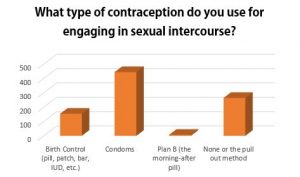Let’s be honest here, getting pregnant as a teenager in high school isn’t a goal for most teens. There are many effective ways to prevent pregnancy and it’s important for students that do not want to be parents to be educated on how have safe sex.
Most health teachers will tell you “abstinence is the best way to prevent pregnancy a std’s.” That is true, but about half (49.9 percent) our students that took the school wide sex survey have participated in some sort of sexual activity, so an alternative for being abstinence is important for that half of students that isn’t practicing abstinence. So for the students apart of the 49.9 percent, that is, engaging or if someone is interested in being sexually active soon, there are many contraceptives, so likely, they can find one that works for them.
First off, the classic and the most popularly used at VHS, condoms. Over half (51.1 percent) of our students use condoms. Condoms are likely sold at your local grocery store and or a nearby gas station. Students can get free condoms at Planned Parenthood. By using the condom correctly, it’s 98 percent effective of preventing pregnancy according to Planned Parenthood, but it is important to read the directions because incorrect use can sufficiently lower the effectiveness of the condom.

Next off is birth control. Birth control has the most varieties in the ways it is used. The first is an oral medication that is taken once a day and if used correctly, (that means taken every day, around the same time) it is 99.9 percent effective according to Planned Parenthood. The birth control pill can be received from a doctor or Planned Parenthood as well. The next birth control is the implant. It’s a small rod that is inserted into the womens upper arm. This is also 99 percent effective in preventing pregnancy and protects one from pregnancy for up to four to five years. Another form of birth control is called an IUD, which is an implant inserted into the woman’s vagina, through the cervix and into the uterus. It is also 99 percent effective if inserted correctly. Depending on what type of IUD it is, they can last anywhere from three to 10 years, all according to Planned Parenthood.
Finally, the last contraceptive is Plan B or also known as “the morning after pill,” taken after unprotected sex to prevent pregnancy. If taken within 24 hours of unprotected sex, the pill is 95 percent effective, but if taken from 24 to 72 hours after unprotected sex, the effectiveness drops to 89 percent, as claimed by Planned Parenthood.
There are many safe and effective ways to prevent pregnancy and have safe sex.








